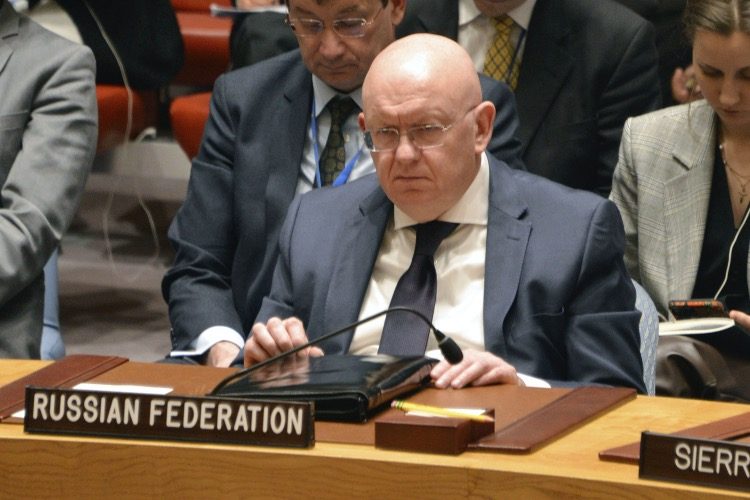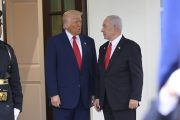
Washington is stoking conflict in the Middle East by staging unlawful strikes in Iraq, Syria, and Yemen, Russian Permanent Representative to the UN Vassily Nebenzia said during the UN Security Council meeting in New York on Monday.
Russia requested an urgent session of the UN Security Council after the United States staged airstrikes in Syria and Iraq following a drone attack on an American military outpost in Jordan.
The bombings have “once again demonstrated the aggressive nature of US policy in the Middle East and Washington’s complete disregard for the norms of international law,” Nebenzia said. The Russian diplomat contended that the United States is “pouring gasoline on the fire” by organizing strikes that pose “a direct threat to international peace and security” and imperil “the central role of the UN.” He reinforced that U.S. bases in Syria are “illegal,” as Damascus has not approved the American military presence.
Addressing the Security Council, U.S. Alternative Representative for Special Political Affairs Robert Wood said that the strikes were “necessary and proportionate, consistent with international law, and in exercise of the United States’ inherent right to self-defense.”
On January 28, a kamikaze drone struck a U.S. outpost known as Tower 22 near the Jordanian-Syrian border, killing three American soldiers. The attack, which the United States blamed on the Iranian-backed Islamic Resistance in Iraq, marked the first deaths of American troops in a series of assaults sparked by the Israel-Hamas war. On their end, the Islamic Resistance in Iraq — an umbrella group for Islamist Shia militias — took responsibility for the attack.
The White House has slammed Iran for masterminding attacks on U.S. personnel. Tehran dismissed the allegations, maintaining that the militias are acting independently and targeting U.S. soldiers due to Washington’s continuing support for Israel during the war with Hamas in Gaza.
On Friday, the Pentagon started retaliation strikes, targeting dozens of sites in Iraq and Syria linked to Iran’s Islamic Revolutionary Guard (IRGC) Quds Force and related militia groups.
“Our response began today” and “will continue at times and places of our choosing,” U.S. President Joe Biden announced in response to the attacks on U.S. troops.
The United States and the U.K. have also been targeting Houthi sites in Yemen in response to Shia militants’ drone and missile attacks on merchant vessels in the Red Sea and the Gulf of Aden. The Houthis have pledged to continue targeting the ships until a permanent ceasefire is declared in Gaza. Besides, the Houthis have said they will continue to target vessels belonging to any nations that are “in any way connected” with Israel until the blockade of the Palestinian enclave is lifted. For its part, the United States has vowed to continue to protect the “freedom of navigation that serves as the bedrock of global trade in one of the world’s most critical waterways.”
Additionally, the Associated Press (AP) reported on Tuesday, citing the U.K.’s Maritime Trade Operations (UKMTO) service and a private security firm, that a suspected Houthi drone off the coast of Yemen in the southern region of the Red Sea attacked a British-owned vessel.
As per the UKMTO, Tuesday’s attack took place west of the Yemeni port of Hodeidah. The service reported that the master of the ship was “aware of a small craft on his Port side” and claimed that a projectile was fired at his vessel, which passed over the deck, giving rise to “slight damage to the bridge windows.”
A source at the British maritime security firm Ambrey told AP that the ship has been identified as a Barbados-flagged, U.K.-owned cargo ship, highlighting that both the crew and the vessel were safe.
Soon after the attack, a spokesman for the Houthi group, Brigadier General Yahya Saree, published a statement claiming that the militants have attacked two separate vessels in the Red Sea, an American ship and a British ship.
The British firm Furadino Shipping, which owns the ship Morning Tide, also told AP that their ship was indeed attacked but pointed out that no one was hurt in the incident and that the vessel was heading toward Singapore.
British Defense Secretary Grant Shapps told the House of Commons on February 5 that combined U.K. and U.S. strikes on the Houthis in Yemen have had a “significant effect” in undermining the group’s abilities to disrupt Red Sea shipping routes. Nonetheless, Shapps elaborated that the Houthi threat “has not been fully diminished.”
The Houthis, who have been striking vessels navigating the waterway in protest against Israel’s offensive against Palestinians in Gaza, “believe they are the region’s Robin Hood,” Shapps claimed. “The only people they are robbing are innocent Yemenis, whose food and aid arrives via the Red Sea,” he added.
Shapps also maintained that the most recent strikes in Yemen on Saturday were “very carefully planned” so that “minimal” civilian casualties might occur, and that the U.K. will not hesitate to take further military action if required.
On Saturday, U.S. Central Command (CENTCOM) reported that its forces, working in conjunction with the U.K. Navy, had staged a series of combined air- and sea-launched strikes on as many as 36 Houthi targets at 13 locations across Yemen. The operation was said to have been meant to “degrade Houthi capabilities used to continue their reckless and unlawful attacks on US and UK ships as well as international commercial shipping.”
The joint operation was organized by Tomahawk missiles fired from U.S. Navy ships, and F/A-18 Hornet fighter-bombers launched from the aircraft carrier USS Eisenhower. CENTCOM said the raid targeted “multiple underground storage facilities, command and control, missile systems, UAV storage and operations sites, radars, and helicopters.”
In response, the Houthis pledged to “meet escalation with escalation.” Mohammed al-Bukhaiti, a spokesman for the militant group, wrote in a post on X that Houthi “military operations against the Zionist entity will continue until the aggression against Gaza stops, no matter what sacrifices it costs us.”




